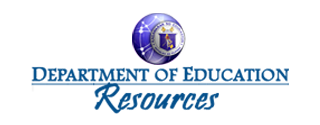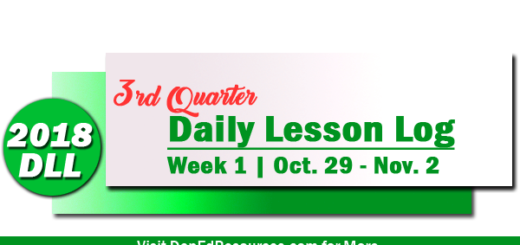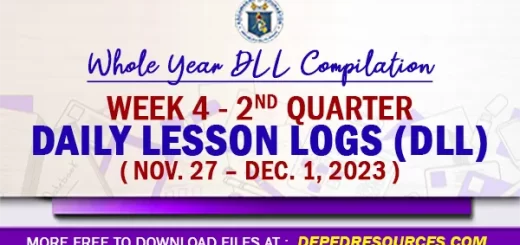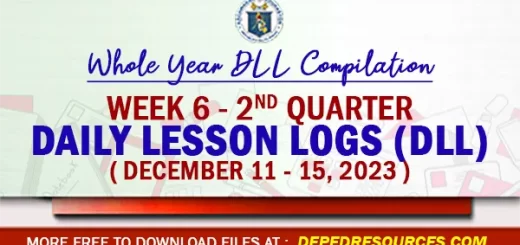Week 1 – 4th Quarter Daily Lesson Log DLL Update | January 14 – 18, 2019
Happy New Year! New and Updated Week 1 – 4th Quarter Daily Lesson Log DLL Update | January 14 – 18, 2019. All DLL are accessible thru Google Drive, the best and fastest way in sharing files.
All throughout the school year, we will be posting weekly updates on daily lesson logs to help our Teachers. Everyone is encouraged to share these files so that everyone could benefit from them. We’ll do our best to format and edit the files before we upload them and ensure the compliance with the K-12 Education program.
These daily lesson log were made in compliance with the Department of Education format.
DepEd Resources credits these files to all the owners and authors as well as those who sent us this files for posting. We will always be thankful of you. You make DepEd Resources possible for our beloved teachers .
Please do LIKE our FB Page to get updates on our file uploads instantly. Thank you.
>>>Approaches Outlined in the K–12 Curriculum
The approaches outlined in the K–12 Curriculum are designed to bring about personalization and precision in learning, starting from the premise that (1) teachers need to know their students, and (2) assessment for learning, in conjunction with professional learning, is critical to achieving that goal. These approaches provide a road map to assist teachers in reaching every student. It is critically important to any attempt to improve student achievement and close the achievement gap. To be effective, professional learning should be learning “in context” – that is, learning that helps teachers develop the particular knowledge and skills they need to provide focused assessment and instruction for the students in their classrooms.
 Commitment to professional learning within school and board communities develops the collective capacity of teachers to work together to achieve the fundamental purpose of the education system – that is, high levels of learning for all students. Every student’s learning experience can be improved when there is a shared commitment to high expectations for every student and when educators are engaged in a collaborative problem-solving process that is focused on student learning. Assessment for learning is integral to this process. Ongoing professional learning is driven by educators to create knowledge and opportunities that support these practices.
Commitment to professional learning within school and board communities develops the collective capacity of teachers to work together to achieve the fundamental purpose of the education system – that is, high levels of learning for all students. Every student’s learning experience can be improved when there is a shared commitment to high expectations for every student and when educators are engaged in a collaborative problem-solving process that is focused on student learning. Assessment for learning is integral to this process. Ongoing professional learning is driven by educators to create knowledge and opportunities that support these practices.
When systems and schools function as professional learning communities, all teachers work collaboratively in a culture of learning to ensure learning for all students and their own professional learning. They work together to close achievement gaps by designing coordinated strategies to ensure that all students receive appropriate and timely assessment and instruction. A successful professional learning community works systematically, addressing the learning needs of all within the entire school community.
In student learning, there is a culture of high expectations that supports the belief that all students can learn, and the school responds in a timely fashion to students who require intervention and support. An effective intervention is time limited, and the student subsequently progresses without ongoing extra support.
In professional learning, there also is a process and practice in place to guide decision making in implementing timely support and interventions through a team approach. The team responds to individual student learning needs and monitors, tracks, and analyses student data to improve student achievement. There are collaboratively constructed learning goals and success criteria, and students are seen as partners in their learning. They see themselves represented in the curriculum, programs, and culture of their school. Students feel a sense of belonging in their classrooms and in their schools and participate in decisions that have an impact on their educational experience.
Teachers understand that they learn and work together to achieve their collective purpose of learning for all. The powerful collaboration that characterizes professional learning is a systematic process in which teachers work together with parents and community partners to analyse and continuously improve their classroom and school practices.
Educators often work in teams, engaging in an ongoing cycle of exploration into ways of focusing assessment and instruction in their classrooms. This approach promotes deep learning among team members and, in turn, leads to higher levels of student achievement. However, the promise of a professional learning community can be realized only if the process is systematic and school-wide. The success of the process ultimately rests on a collective will to pursue collaborative learning, as well as on the ability of the individual to find personal security and confidence in the process of continuous improvement.
Teachers focus their efforts on crucial questions centered on student learning, and develop practical knowledge that reflects that focus, such as identifying learning goals for curriculum planning needs, sharing different kinds of assessment tools, analyzing evidence of learning, and developing and sharing instructional strategies and other approaches for improving results.
In practice, inquiry engages teachers as learners in critical and creative thinking. It honors openness and flexibility. Through collaborative dialogue, teachers seek emergent possibilities. Inquiry positions the teacher as an informed practitioner refining planning, instruction and assessment approaches in the continual pursuit of greater precision, personalization and innovation. A focus on student learning drives inquiry. Based on research, effective teacher inquiry has the following seven characteristics: It is relevant, collaborative, reflective, iterative, reasoned, adaptive, and reciprocal.
Teachers are judged on their effectiveness based on results. Every educator participates in an ongoing process of identifying current levels of achievement, establishing goals to improve those levels, and working together to achieve those goals. Sustaining an effective professional learning community requires that school staff focus on learning as much as teaching, on working collaboratively to improve learning, and on holding themselves accountable for the kinds of results that fuel continued improvements.
When educators work collaboratively to implement an integrated process of assessment and instruction, student achievement can improve. The success of the professional learning community approach depends on the commitment and persistence of the educators within the school.
To Download Week 1 – 4th Quarter Daily Lesson Log DLL Update | January 14 – 18, 2019, just navigate through the following links.
Week 1 – 4th Quarter Daily Lesson Log DLL Update
January 14 – 18, 2019
-
New! Kinder Daily Lesson Log
-
New! Grade 1 Daily Lesson Log
-
New! Grade 2 Daily Lesson Log
-
New! Grade 3 Daily Lesson Log
-
New! Grade 4 Daily Lesson Log
-
New! Grade 5 Daily Lesson Log
-
New! Grade 6 Daily Lesson Log
-
Grades 7 to 12 still processing.
Please visit our website from time to time for new and unannounced additional uploads. Thank you.
You may also request for specific files in our Facebook Page.
Click Here. Don’t forget to LIKE our Page!
Please LIKE and SHARE so everyone would benefit from these files. Thank you!
LIKE US on Facebook! Click Here.
“I cannot do all the good that the world needs. But the world needs all the good that I can do.”
―















